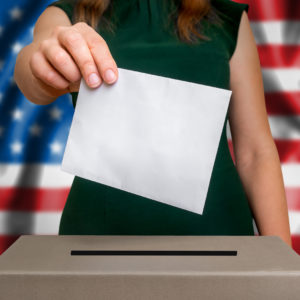They may eventually face off in the 2026 U.S. Senate primary, but on Thursday, Democrats Maggie Goodlander and Chris Pappas were united in their opposition to a federal law ensuring non-citizens don’t vote in U.S. elections.
Both New Hampshire representatives voted against the Safeguard American Voter Eligibility (SAVE) Act. It requires people to provide proof of citizenship when registering to vote in federal elections. It also requires states to remove non-citizens from their official lists of eligible voters.
An identical bill passed the GOP-controlled House last year over the opposition of Pappas and nearly all of his fellow Democrats.
“Despite the ridiculous attacks and purposeful misinformation spread about the bill, I am pleased to see that the House of Representatives once again passed the SAVE Act on a bipartisan basis to ensure only U.S. citizens vote in federal elections,” the bill’s prime sponsor, Rep. Chip Roy (R-Texas), said via social media.
Polls show voters overwhelmingly support requiring people to prove they are citizens when they register to vote. A Gallup poll taken last year found 83 percent of Americans favor proof of citizenship for first-time voter registrants as the SAVE Act requires. And 84 percent support requiring voters to present proof of ID when they vote.
A 2021 Josiah Bartlett Center for Public Policy poll of New Hampshire voters found 76 percent supported requiring a photo ID in order to cast a ballot.
Goodlander and Pappas oppose both of these ballot security policies, and they sided with their fellow Democrats in voting no.
Pappas defended his vote against the proof-of-citizenship requirement in a statement released Thursday.
“I voted no on this legislation today because it would force unnecessary federal changes to state voter registration and election procedures, creating even more undue burdens for married women, military members and their families, and seniors when they go to vote.”
Ironically, Pappas was an outspoken supporter of the “For The People Act,” a federal law that would have mandated states conduct early voting, count ballots that came in late, and allow no-excuse mail-in ballots. The Democrat-backed bill would also have banned voter ID mandates.
In 2021, Pappas called those federally-imposed election rules “crucial reforms that will ensure our government is truly of, by, and for the people.”
Goodlander, who has only been in Congress since January, also released a statement defending her vote against the popular policy.
In it, she claims married New Hampshire women whose last name no longer matches their birth certificate would be blocked from registering to vote.
“These women would not be able to use their birth certificates to prove their citizenship under the SAVE Act. And, if they do not have a passport, which roughly 44.5 percent of Granite Staters do not, they would not be able to register to vote at all under the SAVE Act,” Goodlander claimed.
But one of the forms of ID accepted under the SAVE Act is a REAL ID compliant driver’s license or state-issued ID, and more than 60 percent of Granite Staters, male and female, have one. New Hampshire state law already requires people who’ve changed their names, usually due to marriage, to provide documentation in order to get a REAL ID license.
The state even has a “Name Change Wizard” on its REAL ID website to help people navigate the process, which usually involves providing a marriage license. As of May 7, everyone 18 or older will need a REAL ID or other identification accepted by the TSA to fly even within the U.S.
That will apply to married women.
Goodlander’s statement referenced the fact that New Hampshire passed a law similar to the SAVE Act last year, and it’s already in effect. It also included this eye-popping claim from Joan Dargie, president of the New Hampshire City and Town Clerks Association:
“New Hampshire recently enacted a bill that is very similar to the SAVE Act, and it has already disenfranchised voters in New Hampshire from voting in their town elections. We estimate between 10 and 50 percent of voters will be turned away from voting on election day.”
Given that more than 600,000 people voted in the 2022 midterms, Dargie predicts between 60,000 and 300,000 voters won’t be allowed to vote next year.
According to reporting by the Associated Press, the total number of people who tried to register statewide on the day of the March 11 town elections and were turned away was around 60.
Ballot security and voter ID are likely to be part of next year’s U.S. Senate election. National Republican Senatorial Committee Regional Press Secretary Nick Puglia called out the two New Hampshire Democrats after their vote.
“Pappas and Goodlander are so desperate to win over the far left, they’re refusing to support basic legislation that ensures only U.S. citizens vote in federal elections. Granite Staters deserve a senator who will champion common sense — not insanity.”





